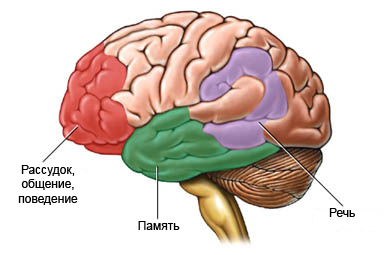Alzheimer's Disease – Dementia Alytsgeymera
Description of Alzheimer's disease
Alzheimer's disease is a progressive disease, which destroys brain cells. This is the most common cause of dementia (dementias). People with this disease slowly They lose the ability to learn, functioning and memory.

Causes of Alzheimer's disease
The cause is not yet known. Studies show, that there are two basic mechanisms, associated with the development of Alzheimer's disease:
- Plaques – deposition of substances called amyloid-beta in the various regions of the brain;
- Neurofibrillary tangles – adhesion (union) fiber (the so-called tau fibers) nerve cells.
Risk factors for Alzheimer's Disease
Factors, which may increase the likelihood of Alzheimer's disease include:
- Age: 65 and older;
- Prior serious head injury;
- Down's syndrome;
- Down syndrome have close relatives;
- Women up 35 years, who give birth to a child with Down syndrome;
- Smoking;
- Having family Alzheimer patients;
- The presence of a certain type of different proteins (APOE-e4);
- Depression;
- Elevated levels of homocysteine;
- Heart disease.
Researchers are studying the following factors to see, they are associated with Alzheimer's disease:
- Poor nutrition and vitamin deficiency in childhood;
- Elevated levels of metals in the blood, especially zinc, Copper, aluminum and iron;
- Some viral infections;
- Diabetes;
- High cholesterol.
Symptoms of Alzheimer's disease
The disease begins in the form of lung failure memory, and progressing to profound loss of memory and function. Alzheimer's disease is divided into three stages:
- An early form – loss of memory and cognition noticeable, but the brain is still able to function;
- Interim – mental illness, personality changes, dependence on others for basic needs;
- Weight – the loss of identity and functions of the body, inability to care for themselves.
Symptoms include:
- Problems with memory:
- Failure to identify familiar places;
- Inability to remember friends and family members;
- Forgetfulness;
- Inability to solve the easy math problems;
- The inability to perform daily activities, such as cooking, dressing, bathing, etc.;
- Scattering;
- Difficulties with construction proposals for forgetting the words (may progress to complete inability to speak);
- Inability to remember the date, Times of Day, season;
- Frequent mood swings;
- Closed, loss of interest in any type of activity;
- Personality changes;
- Slow, shuffling gait;
- Poor coordination;
- Losing purposeful movement.
Diagnosis of Alzheimer's disease
There are no tests, to definitively diagnose this disease. The doctor looks at the symptoms and medical history. Produced physical examination. This will help to rule out other causes.
Assays, to rule out other conditions may include:
- Neurological tests;
- Testing of psychological and mental state;
- CT scan – to make pictures of the brain;
- MRT – test, which uses magnetic waves, to make pictures of the brain;
- Electroencephalogram (EEG) – test, which measures the electrical activity in the brain;
- Blood and urine tests;
- Poyasnichnaya puncture – to check the level of certain brain proteins, are increased in Alzheimer's disease and, to rule out other disorders;
- PET-scan of the brain – test, which makes the image, showing brain activity.
Treatment of Alzheimer's disease
There are no treatments for Alzheimer's Disease. There are also no certain ways to slow its progression. To treat some of the symptoms have been approved four drugs. Various drugs studied, to see, if they can cure the symptoms or slow the course of disease.
Medications to reduce the symptoms and progression of the disease
Only two types of drugs have been approved for reducing the symptoms of Alzheimer's disease:
Cholinesterase inhibitors – approved and recommended for mild to moderate forms of Alzheimer's disease (donepezil, rivastigmine, galantamin);
N-methyl-D-Aspartate (NMDA) receptor antagonists, approved for treatment of moderate to severe Alzheimer's disease (Memantine).
Therapies, who investigated, They include:
- Gamma-secretase inhibitors;
- Aggregation inhibitors of tau fibers;
- Plants and additives (eg, Vitamin E, ginkgo biloba) – evidence of the effectiveness of these natural remedies not been studied.
Environment
Treatment of the disease involves:
- Creating an environment, where you can obtain the necessary medical care;
- Optimization of the quality of life;
- Keeping the patient in safety;
- Providing quiet, quiet, predictable environment;
- Provide appropriate glasses and hearing aids;
- Listening to soft music;
- Behavior when sick, contributing to a decrease in arousal and facilitates depression;
- Frequent presence in the circle of family and close friends.
Treatment of psychiatric symptoms
Psychiatric symptoms may occur with the aggravation of Alzheimer's disease. Your doctor may prescribe medication to treat:
- Depression;
- Alarms;
- Ravel, paranoji, gallyutsinatsii.
Preventing Alzheimer's
Currently, there are no methods for the prevention of Alzheimer's disease, since it is unclear the reason of its occurrence.
